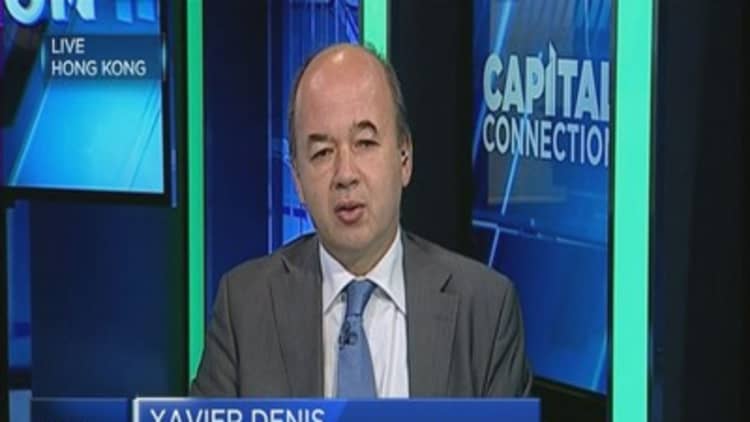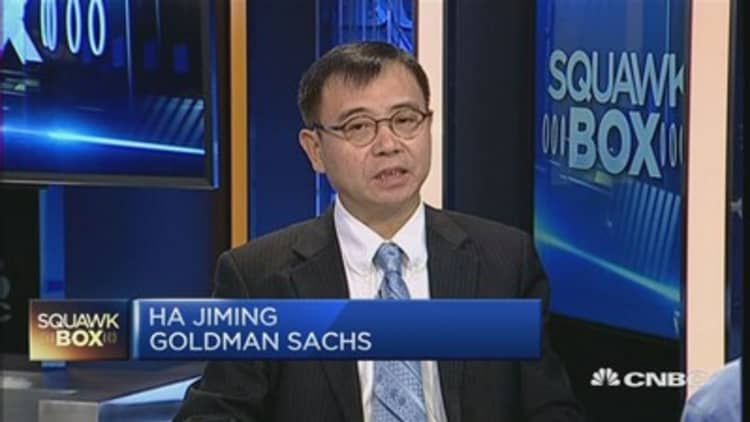
With the Shanghai Composite back into a technical bull market Thursday, traders and analysts have been contemplating whether the time is right to gain exposure to Chinese stocks after a rollercoaster year.
China's key Shanghai Composite trimmed gains on Thursday afternoon to close up 1.9 percent. From its low on August 26 it has now rallied 20.34 percent, entering a technical bull market. The Shanghai bourse also hit an intra-day high of 3,585 points Thursday, its highest level since August 21.
"The bulls are back in the China shop," Brenda Kelly, the head analyst at London Capital Group, told CNBC via email on Thursday.
Securities firms were the clear winners on Thursday; Industrial Securities, Huatai Securities, Founder Securities and Everbright Securities hit the daily upward limit of 10 percent, while China Merchants Securities, Citic Securities and Haitong Securities tacked on between 5.9 and 7.5 percent.
Banks got a lift from the positive sentiment surrounding the securities firms, with Industrial and Commercial Bank of China (ICBC) and Bank of China rallying about 2 percent each.
Manufacturing data this week from the world's second largest economy was relatively lukewarm and there appears to be no real explanation behind this week's move. However, there is an underlying consensus from the investment community that the country's central bank is waiting in the wings, ready to provide more stimulus and push stocks higher.
"There's a China QE (quantitative easing) program that it's undertaking at the moment. We've seen evidence of that. And that's what they're (the People's Bank of China) going to continue," Sam Le Cornu, co-head of Asian Listed Equities & Head of Investments at Macquarie Investment Management, told CNBC Thursday.
The central bank cut interest rates last month for the sixth time in a year. However, Le Cornu believes that it could start aggressively pumping more liquidity into its economy once its currency is officially accepted into the International Monetary Fund's benchmark currency basket.
"If they (the PBOC) cut (its main benchmark rate) by 1,000 basis points, that's over 12 trillion (yuan) ($1.89 trillion) that will flood into the market...and that's a lot of money," Le Cornu said.
Paul Gambles, co-founder of MBMG Group and an advisory board member of IDEA Economics, is one investor who has already turned positive with the upturn in Chinese stocks. At the end of October, he spoke of the merits of having a small exposure to China using something like the Deutsche X-trackers CSI 300 China A-Shares Hedged Equity exchange traded fund.
Xavier Denis, a global strategist at SG Securities, is also turning a little more bullish. He told CNBC Thursday that he was expecting an "end of year rally" for China which should deliver "positive returns."

Nonetheless, he remained relatively wary on the country over the longer term.
"I think there are lots of questions about the Chinese growth deceleration and the fact that the (U.S. Federal Reserve) is going to hike at some point. And this is probably going to prove to be a cap on any significant upside of the markets," he said.
The Shanghai Composite index - still in its relative infancy compared to its U.S. counterparts – screeched higher in 2015 by 54 percent until the middle of June. After hitting a peak of 5,166 points the benchmark tanked around 40 percent in just over a month. The sudden and sharp falls came after the PBOC devalued its currency and managed to rattle markets globally in August and September.
—CNBC's See Kit Tang contributed to this article.




